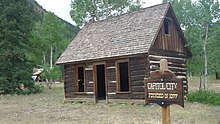Hinsdale County
Geography
According to the U.S. Census Bureau, the county has a total area of 1,123 square miles (2,910 km), of which 1,117 square miles (2,890 km) is land and 5.9 square miles (15 km) (0.5%) is water.
Hinsdale County is one of the most remote counties in Colorado and the United States. The county is covered by mountains, including multiple fourteeners, and contains one of the largest roadless areas in the country. The continental divide crosses the county twice. Most of the county is divided among several different national forests and the Weminuche Wilderness area.
Adjacent counties
- Gunnison – north
- Saguache – northeast
- Mineral – east
- Archuleta – southeast
- La Plata – southwest
- San Juan – west
- Ouray – northwest
Major highways
Demographics
| Census | Pop. | Note | %± |
|---|---|---|---|
| 1880 | 1,487 | — | |
| 1890 | 862 | −42.0% | |
| 1900 | 1,609 | 86.7% | |
| 1910 | 646 | −59.9% | |
| 1920 | 538 | −16.7% | |
| 1930 | 449 | −16.5% | |
| 1940 | 349 | −22.3% | |
| 1950 | 263 | −24.6% | |
| 1960 | 208 | −20.9% | |
| 1970 | 202 | −2.9% | |
| 1980 | 408 | 102.0% | |
| 1990 | 467 | 14.5% | |
| 2000 | 790 | 69.2% | |
| 2010 | 843 | 6.7% | |
| 2020 | 788 | −6.5% | |
| 2023 (est.) | 765 | −2.9% | |
| U.S. Decennial Census 1790-1960 1900-1990 1990-2000 2010-2020 | |||
As of the census of 2000, there were 790 people, 359 households, and 246 families living in the county. The population density was 0.7 people per square mile (0.27 people/km). There were 1,304 housing units at an average density of 1.2 units per square mile (0.46 units/km). The racial makeup of the county was 97.34% White, 1.52% Native American, 0.25% Asian, 0.38% from other races, and 0.51% from two or more races. 1.52% of the population were Hispanic or Latino of any race.
There were 359 households, out of which 23.4% had children under the age of 18 living with them, 61.0% were married couples living together, 4.7% had a female householder with no husband present, and 31.20% were non-families. 24.8% of all households were made up of individuals, and 3.1% had someone living alone who was 65 years of age or older. The average household size was 2.2 and the average family size was 2.6.
In the county, the population was spread out, with 19.5% under the age of 18, 4.7% from 18 to 24, 29.5% from 25 to 44, 34.7% from 45 to 64, and 11.6% who were 65 years of age or older. The median age was 44 years. For every 100 females there were 105.7 males. For every 100 females age 18 and over, there were 109.9 males.
The median income for a household in the county was $37,279, and the median income for a family was $42,159. Males had a median income of $26,210 versus $23,750 for females. The per capita income for the county was $22,360. About 4.5% of families and 7.2% of the population were below the poverty line, including none of those under age 18 and 2.2% of those age 65 or over.
Politics
Republican presidential nominees have carried Hinsdale County since Franklin Delano Roosevelt defeated Alf Landon by eight votes in 1936. Along with Elbert County and Washington County it was one of three Colorado counties to vote for Barry Goldwater over Lyndon Johnson in 1964. In 2020, Joe Biden received the highest vote share for a Democrat since Johnson, and became the third Democrat since 1940 to breach 40% of the vote.
The last Democrat to carry Hinsdale County in a statewide election was John Hickenlooper in the 2010 gubernatorial contest, and the only other case since at least 1980 have been Democratic senator Ben “Nighthorse” Campbell, who was later to shift to the Republican Party, in 1992, alongside popular Governor Roy Romer, who carried all but three counties statewide, in 1990.
| Year | Republican | Democratic | Third party(ies) | |||
|---|---|---|---|---|---|---|
| No. | % | No. | % | No. | % | |
| 2024 | 332 | 54.70% | 257 | 42.34% | 18 | 2.97% |
| 2020 | 353 | 55.85% | 255 | 40.35% | 24 | 3.80% |
| 2016 | 339 | 57.56% | 197 | 33.45% | 53 | 9.00% |
| 2012 | 353 | 58.83% | 229 | 38.17% | 18 | 3.00% |
| 2008 | 344 | 57.43% | 240 | 40.07% | 15 | 2.50% |
| 2004 | 355 | 58.97% | 236 | 39.20% | 11 | 1.83% |
| 2000 | 316 | 55.83% | 188 | 33.22% | 62 | 10.95% |
| 1996 | 289 | 52.83% | 185 | 33.82% | 73 | 13.35% |
| 1992 | 188 | 39.50% | 151 | 31.72% | 137 | 28.78% |
| 1988 | 295 | 72.48% | 111 | 27.27% | 1 | 0.25% |
| 1984 | 310 | 74.88% | 98 | 23.67% | 6 | 1.45% |
| 1980 | 232 | 69.05% | 76 | 22.62% | 28 | 8.33% |
| 1976 | 189 | 66.55% | 83 | 29.23% | 12 | 4.23% |
| 1972 | 172 | 77.48% | 44 | 19.82% | 6 | 2.70% |
| 1968 | 127 | 66.15% | 43 | 22.40% | 22 | 11.46% |
| 1964 | 107 | 53.23% | 94 | 46.77% | 0 | 0.00% |
| 1960 | 138 | 62.73% | 82 | 37.27% | 0 | 0.00% |
| 1956 | 155 | 76.73% | 47 | 23.27% | 0 | 0.00% |
| 1952 | 154 | 74.04% | 54 | 25.96% | 0 | 0.00% |
| 1948 | 133 | 63.94% | 75 | 36.06% | 0 | 0.00% |
| 1944 | 124 | 67.03% | 61 | 32.97% | 0 | 0.00% |
| 1940 | 150 | 58.82% | 103 | 40.39% | 2 | 0.78% |
| 1936 | 129 | 47.78% | 137 | 50.74% | 4 | 1.48% |
| 1932 | 94 | 38.21% | 138 | 56.10% | 14 | 5.69% |
| 1928 | 128 | 53.78% | 106 | 44.54% | 4 | 1.68% |
| 1924 | 138 | 50.00% | 79 | 28.62% | 59 | 21.38% |
| 1920 | 149 | 59.13% | 67 | 26.59% | 36 | 14.29% |
| 1916 | 94 | 31.13% | 178 | 58.94% | 30 | 9.93% |
| 1912 | 136 | 38.64% | 157 | 44.60% | 59 | 16.76% |
| 1908 | 156 | 38.71% | 215 | 53.35% | 32 | 7.94% |
| 1904 | 243 | 47.55% | 239 | 46.77% | 29 | 5.68% |
| 1900 | 230 | 27.68% | 595 | 71.60% | 6 | 0.72% |
| 1896 | 19 | 2.63% | 697 | 96.40% | 7 | 0.97% |
| 1892 | 412 | 25.81% | 0 | 0.00% | 1,184 | 74.19% |
| 1888 | 158 | 57.66% | 116 | 42.34% | 0 | 0.00% |
| 1884 | 245 | 57.11% | 180 | 41.96% | 4 | 0.93% |
| 1880 | 421 | 53.84% | 361 | 46.16% | 0 | 0.00% |
Recreation
National forests
- Gunnison National Forest
- Rio Grande National Forest
- San Juan National Forest
- Uncompahgre National Forest
National wilderness areas
Trails
- Colorado Trail
- Continental Divide National Scenic Trail
- West Lost Trail Creek National Recreation Trail
Scenic byways
Communities

Town
Census-designated places
Ghost towns
- Beartown
- Burrows Park
- Capitol City
- Carson
- Henson
- Old Carson
Education
School districts include:
See also
- Bibliography of Colorado
- Geography of Colorado
- History of Colorado
- Index of Colorado-related articles
- List of Colorado-related lists
- Outline of Colorado
References
- ^ "State & County QuickFacts". United States Census Bureau. Retrieved September 5, 2021.
- ^ "Find a County". National Association of Counties. Archived from the original on May 31, 2011. Retrieved June 7, 2011.
- ^ Gannett, Henry (1905). The Origin of Certain Place Names in the United States. Govt. Print. Off. pp. 157.
- ^ "US Gazetteer files: 2010, 2000, and 1990". United States Census Bureau. February 12, 2011. Retrieved April 23, 2011.
- ^ Watts, Raymond D.; Compton, Roger W.; McCammon, John H.; Rich, Carl L.; Wright, Stewart M.; Owens, Tom; Ouren, Douglas S. (May 4, 2007). "Roadless Space of the Conterminous United States". Science. 316 (5825): 736–738. doi:10.1126/science.1138141. ISSN 0036-8075.
- ^ Tracy Staedter (May 3, 2007). "Roadless Space Uneven Across U.S." Discovery News. Archived from the original on May 6, 2007.
- ^ "Annual Estimates of the Resident Population for Counties: April 1, 2020 to July 1, 2023". United States Census Bureau. Retrieved March 31, 2024.
- ^ "U.S. Decennial Census". United States Census Bureau. Archived from the original on April 26, 2015. Retrieved June 8, 2014.
- ^ "Historical Census Browser". University of Virginia Library. Retrieved June 8, 2014.
- ^ "Population of Counties by Decennial Census: 1900 to 1990". United States Census Bureau. Retrieved June 8, 2014.
- ^ "Census 2000 PHC-T-4. Ranking Tables for Counties: 1990 and 2000" (PDF). United States Census Bureau. Archived (PDF) from the original on March 27, 2010. Retrieved June 8, 2014.
- ^ Dave Leip’s U.S. Election Atlas; 2010 Gubernatorial General Election Results – Colorado
- ^ Dave Leip’s U.S. Election Atlas; 1990 Gubernatorial General Election Results – Colorado
- ^ Leip, David. "Dave Leip's Atlas of U.S. Presidential Elections". uselectionatlas.org. Retrieved May 26, 2017.
- ^ "Ghost Towns of Colorado- Hinsdale County". Ghost Towns. Retrieved June 21, 2020.
- ^ "2020 CENSUS - SCHOOL DISTRICT REFERENCE MAP: Hinsdale County, CO" (PDF). U.S. Census Bureau. Archived (PDF) from the original on July 13, 2022. Retrieved July 15, 2022. - Text list
